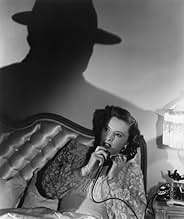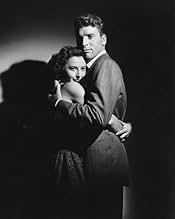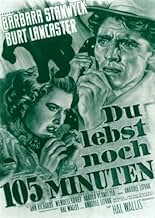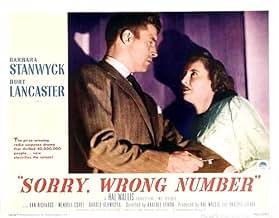NOTE IMDb
7,3/10
14 k
MA NOTE
Au téléphone, une femme invalide surprend une conversation téléphonique qu'elle pense être un complot de meurtre et tente de l'empêcher.Au téléphone, une femme invalide surprend une conversation téléphonique qu'elle pense être un complot de meurtre et tente de l'empêcher.Au téléphone, une femme invalide surprend une conversation téléphonique qu'elle pense être un complot de meurtre et tente de l'empêcher.
- Réalisation
- Scénario
- Casting principal
- Nommé pour 1 Oscar
- 3 victoires et 3 nominations au total
Bill Cartledge
- Page Boy
- (non crédité)
Cliff Clark
- Police Sergeant Duffy
- (non crédité)
Joyce Compton
- Cotterell's Blonde Girlfriend
- (non crédité)
Ashley Cowan
- Clam Digger
- (non crédité)
Yola d'Avril
- French Maid
- (non crédité)
Suzanne Dalbert
- Cigarette Girl
- (non crédité)
Avis à la une
Alfred Hitchcock himself praised this movie that was for him one of Barbara Stanwyck's most extraordinary parts.Besides,he did include Lucille Fletcher's short novel in his anthology "stories not for the nervous"(sic)
The story of this woman in her bed,who has heard on the phone someone is in danger,and who little by little discovers the horrible truth,is a first-class screen play which requires the viewer's attention,,or else he may lose the vital lead.The first people who enjoyed it had no pictures,since it was originally a radio broadcast,so they had to show a lot of imagination.The movie remains talky but the numerous flashbacks give it substance.The phone,is along with Stanwyck ,the star of Litvak's work;Burt Lancaster,a great actor though,only serves as a foil to both of them.50% of the dialogue consists of phone calls,that's what makes this thriller unique.
A strong connection with Hitchcock's work is the father's part(Ed Bigley).He is some equivalent of the Mother in many movies of his.The stuffed animals in his desirable mansion are a symbol of his daughter's lifelessness.(Coincidence?There will be such hunting trophies (and more) in his "psycho" twelve years later,and the topic is present in "the man who knew too much"(2nd version))
If you are fond of suspense,this is an unqualified must!
The story of this woman in her bed,who has heard on the phone someone is in danger,and who little by little discovers the horrible truth,is a first-class screen play which requires the viewer's attention,,or else he may lose the vital lead.The first people who enjoyed it had no pictures,since it was originally a radio broadcast,so they had to show a lot of imagination.The movie remains talky but the numerous flashbacks give it substance.The phone,is along with Stanwyck ,the star of Litvak's work;Burt Lancaster,a great actor though,only serves as a foil to both of them.50% of the dialogue consists of phone calls,that's what makes this thriller unique.
A strong connection with Hitchcock's work is the father's part(Ed Bigley).He is some equivalent of the Mother in many movies of his.The stuffed animals in his desirable mansion are a symbol of his daughter's lifelessness.(Coincidence?There will be such hunting trophies (and more) in his "psycho" twelve years later,and the topic is present in "the man who knew too much"(2nd version))
If you are fond of suspense,this is an unqualified must!
An expanded radio play and subsequent TV drama, this film builds terrific tension around a bedridden heiress and her telephone.
Sympathy builds for this unlikeable woman, Leona, played by Barbara Stanwyck. She is a spoiled heiress used to getting her own way, but as we come to see, very much created by her father (played by Ed Begley) who bows to all her wishes.
Her husband, Henry, played by Burt Lancaster, whom she chases and captures from her best friend, initially goes along with being an employee in her father's corporation but eventually starts chafing at the restraints imposed on him.
The movie just about plays in real time with the addition of many flashbacks, one of which secures the knowledge that there is nothing wrong with Leona, it is all psychosomatic based on her mother's fatal illness.
From the moment Leona accidentally overhears a plotted murder for later on that evening, the viewer is taken on a ride that builds suspense and tension to a terrifying conclusion and the movie's title.
Not to be missed. The cinematography is superb, a lot of play in light and shade. Barbara deserved an Oscar but lost. 8 out of 10.
Sympathy builds for this unlikeable woman, Leona, played by Barbara Stanwyck. She is a spoiled heiress used to getting her own way, but as we come to see, very much created by her father (played by Ed Begley) who bows to all her wishes.
Her husband, Henry, played by Burt Lancaster, whom she chases and captures from her best friend, initially goes along with being an employee in her father's corporation but eventually starts chafing at the restraints imposed on him.
The movie just about plays in real time with the addition of many flashbacks, one of which secures the knowledge that there is nothing wrong with Leona, it is all psychosomatic based on her mother's fatal illness.
From the moment Leona accidentally overhears a plotted murder for later on that evening, the viewer is taken on a ride that builds suspense and tension to a terrifying conclusion and the movie's title.
Not to be missed. The cinematography is superb, a lot of play in light and shade. Barbara deserved an Oscar but lost. 8 out of 10.
Heck of a thriller, though the narrative is difficult to piece together at times. Stanwyck gets to run through a gamut of hysterical emotions as the intended victim. Her Leona is not particularly likable as the rich man's daughter who gets her way by bullying people around her. So there's some rough justice in her predicament—alone, disabled and dependent on the phone while a killer seemingly stalks her. Even the independent working-man, a studly Henry (Lancaster), is bullied into taking up with her. Of course, it doesn't hurt that she's got scads of money to assist her schemes. Incidentally, catch how Henry's several capitulations to others (Leona, Morano) are marked by allowing them to light his cigarette. Nice touch.
The idea of only gradually revealing why Leona is being set up for murder is a good one. It adds to the suspense—not just a 'when' but also a 'why'. The trouble is the disclosure is only revealed in pieces over the phone using flashbacks, and these are hard to piece together over a stretch of time. But enough comes through that we get the idea. There's some great noir photography from Sol Polito that really adds to the tense atmosphere. Anyhow, it's a great premise that also played well over the radio that I recall as a kid. It's also a subtle irony that one could end up being so alone in the middle of a great city. Poor Leona, maybe if she had been a little nicer and less bossy over the phone, she might have made the human connection she needed.
The idea of only gradually revealing why Leona is being set up for murder is a good one. It adds to the suspense—not just a 'when' but also a 'why'. The trouble is the disclosure is only revealed in pieces over the phone using flashbacks, and these are hard to piece together over a stretch of time. But enough comes through that we get the idea. There's some great noir photography from Sol Polito that really adds to the tense atmosphere. Anyhow, it's a great premise that also played well over the radio that I recall as a kid. It's also a subtle irony that one could end up being so alone in the middle of a great city. Poor Leona, maybe if she had been a little nicer and less bossy over the phone, she might have made the human connection she needed.
A woman confined to a bed overhears a murder plot on a crossed telephone line and tries to alert the police. The plot structure is quite convoluted, with most of the story told in flashbacks. In fact there are flashbacks within flashbacks, making it somewhat hard to follow. The audience is supposed to feel sympathy for Stanwyck, but the character is too self-centered and whiny for that to happen. Given her character's propensity for histrionics, the actress manages to keep her performance somewhat controlled; Lancaster is fine as her trophy husband. Litvak creates a good film noir atmosphere, although at times his camera roams aimlessly, becoming a distraction.
Sorry, but 'Sorry, Wrong Number' loses a lot in its transition to the screen. For one thing, there are too many flabby flashbacks--a form quite popular in the '40s but used extensively in this film, ad nauseum. All of the suspenseful action in the bedroom of the bedridden victim is held at bay while we watch another endless flashback attempting to show us how selfish and unworthy this woman is. If you heard the original radio drama with Agnes Moorehead giving a spine-chilling portrait of Leona, you'll see why the film becomes too diffuse in an attempt to give us "filler material". The fact that Lucille Fletcher adapted her own work for the screen would give the viewer hope that this is going to be just as good as the radio drama--but it's not. Barbara Stanwyck gives an excellent performance, bordering on hysteria toward the finale--but it's an actressy performance and not as controlled as some of her other film noir roles. Burt Lancaster has a colorless role and can't do much with it. Ann Richards is impressive as the woman who tries to warn Leona. By expanding the plot outside the bedroom, Fletcher created a confusing number of sub-plots that simply take away from the tension. Too much padding actually hurts the film. Anatole Litvak's direction is strong--but not strong enough to put the film on the same level with the classic radio drama. The plot is overcomplicated to the nth degree.
Trivia note: The only other film with such heavy use of flashbacks to tell a complicated story is THE LOCKET ('47), but it was done more efficiently than it is here.
Trivia note: The only other film with such heavy use of flashbacks to tell a complicated story is THE LOCKET ('47), but it was done more efficiently than it is here.
Le saviez-vous
- AnecdotesAnatole Litvak: When Henry is having lunch with Sally, he asks the waiter if he knows who the gentleman is in the dark glasses at the table behind him. It's the director of the film.
- GaffesTwice, Leona turns on a radio, and music begins instantly and strongly. Radios of the film's era contained vacuum tubes that needed some time to warm up.
However, this would be filmmaker's prerogative, not wanting to slow the pace of the film with extended silence.
- Citations
Henry Stevenson: [to Leona] I want you to do something. I want you to get yourself out of the bed, and get over to the window and scream as loud as you can. Otherwise you only have another three minutes to live.
- Crédits fousPROLOGUE: "In the tangled networks of a great city, the telephone is the unseen link between a million lives...It is the servant of our common needs-the confidante of our inmost secrets...life and happiness wait upon its ring...and horror...and loneliness...and...death!!!"
- ConnexionsEdited into Les cadavres ne portent pas de costard (1982)
Meilleurs choix
Connectez-vous pour évaluer et suivre la liste de favoris afin de recevoir des recommandations personnalisées
- How long is Sorry, Wrong Number?Alimenté par Alexa
Détails
- Date de sortie
- Pays d’origine
- Langue
- Aussi connu sous le nom de
- Al filo de la noche
- Lieux de tournage
- Hollywood, Californie, États-Unis(telephone switchboard at a telephone company office on Gower St.)
- Société de production
- Voir plus de crédits d'entreprise sur IMDbPro
Box-office
- Montant brut mondial
- 1 974 $US
- Durée
- 1h 29min(89 min)
- Couleur
- Rapport de forme
- 1.37 : 1
Contribuer à cette page
Suggérer une modification ou ajouter du contenu manquant




































